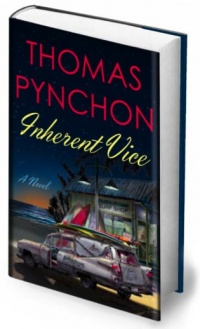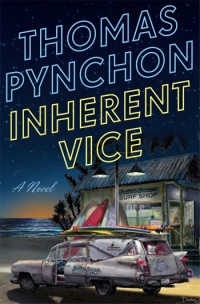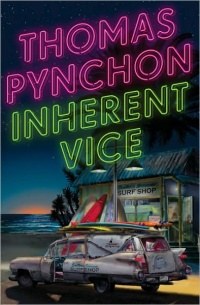Difference between revisions of "Inherent Vice cover analysis"
| (11 intermediate revisions by 4 users not shown) | |||
| Line 1: | Line 1: | ||
| − | + | ==Cover Art== | |
| + | '''NOTE:''' You can view ''Inherent Vice'' cover art over time at [http://thomaspynchon.com/pynchon-cover-art/inherent-vice/ ThomasPynchon.com]. | ||
| − | + | The cover illustration is by Maui artist Darshan Zenith (see his [http://www.darshanzenith.com/ Official site]). The piece is called "Eternal Summer," and subtitled, "A 'Retired' Caddy Hearse Greets Daybreak at a Beach Surf Shop." Prints of the painting can be purchased [http://www.cruiserart.com/1959_hawaiian-surf-surfer-surfing-art.htm here]. The 1959 Cadillac Hearse is parked in front of the "Endless Summer Surf Shop" (namechecking [http://en.wikipedia.org/wiki/Endless_Summer_%28album%29 the Beach Boys Greatest Hits collection] and [http://en.wikipedia.org/wiki/The_Endless_Summer Bruce Brown's 1966 surfing documentary]!). | |
The way Darshan creates his pieces is quite interesting. He paints only the background of the image (the sky, sea, palm trees &c.) and scans the painting into his computer. He then uses 1:18-scale metal diecast models of the cars, photographed against a white background, and loads the digital photo into the computer. From this point on, it's all Photoshop, integrating the car image into the background painting, and then creating the details with Photoshop tools. So the final work is a digital creation, and there is no original painting of the work. I was told that the basic structure of the surf shack was also part of the original painting for the Caddy Hearse piece. Also, Darshan apparently had the 1966 Bruce Brown film in mind when naming the shack "Endless Summer." | The way Darshan creates his pieces is quite interesting. He paints only the background of the image (the sky, sea, palm trees &c.) and scans the painting into his computer. He then uses 1:18-scale metal diecast models of the cars, photographed against a white background, and loads the digital photo into the computer. From this point on, it's all Photoshop, integrating the car image into the background painting, and then creating the details with Photoshop tools. So the final work is a digital creation, and there is no original painting of the work. I was told that the basic structure of the surf shack was also part of the original painting for the Caddy Hearse piece. Also, Darshan apparently had the 1966 Bruce Brown film in mind when naming the shack "Endless Summer." | ||
| − | Update: Cruiser Art sent along a link to the same model they used for the painting, now on [http://cgi.ebay.com/1959-CADILLAC-CROWN-ROYAL-LIMOSINE-STYLE-HEARSE-1-18_W0QQitemZ200282336708QQcmdZViewItemQQptZDiecast_Vehicles?hash=item200282336708&_trksid=p3286.c0.m14&_trkparms=72%3A1205|66%3A2|65%3A12|39%3A1|240%3A1318|301%3A1|293%3A1|294%3A50#ht_5692wt_941 sale | + | Apparently, Pynchon was searching the Web for the right image for the Inherent Vice cover, found the [http://www.cruiserart.com/ Cruiser Art website] and the "Caddy Hearse" piece, and wanted to use it. [source?] Penguin contacted Cruiser Art and obtained the appropriate permissions. |
| + | |||
| + | Update: Cruiser Art sent along a link to the same model they used for the painting, now on [http://cgi.ebay.com/1959-CADILLAC-CROWN-ROYAL-LIMOSINE-STYLE-HEARSE-1-18_W0QQitemZ200282336708QQcmdZViewItemQQptZDiecast_Vehicles?hash=item200282336708&_trksid=p3286.c0.m14&_trkparms=72%3A1205|66%3A2|65%3A12|39%3A1|240%3A1318|301%3A1|293%3A1|294%3A50#ht_5692wt_941/ sale at ebay]. It's a 1959 Cadillac Crown Royal Limousine Style Hearse. Steve Rummel, Darshan's business partner, adds: "We painted the landau top white. Notice it comes complete with a casket, but we couldn't figure any way to use it." | ||
| + | |||
| + | ==Cover Design== | ||
| + | The book jacket design is by Darren Haggar and Tal Goretsky. The font used in the neon title is called [http://new.myfonts.com/fonts/bitstream/drescher-grotesk-bt/ Drescher Grotesk]. | ||
| + | |||
| + | ==Cover Analysis and Interpretation== | ||
| + | |||
| + | *This artist with the Pynchonian name, Darshan Zenith, believes his image depicts daybreak. Which it certainly could if that's a Hawaiian surf shop. But once the image is transposed to represent a surf shop somewhere near Gordita Beach & the alternate universe of ''Inherent Vice'', the "sunrise" must become a sunset, since SoCal faces west. So when DZ's image becomes attached to Pynchon's narrative its meaning changes. Sunset's of course more appropriate for the mood of Pynchon's Noir anyway, since it's pretty much the end of an era that's occurring as Doc pursues his investigations.... | ||
| + | |||
| + | *In light of the excellent distinction made above between Hawaii sunrise and California sunset, the cover seems to contribute meaningfully to the novel's [[Lemuria]] strand (pages 108-109, especially, where the narrator recounts an acid trip Doc once had in which he imagined Lemuria and Atlantis as embattled, mythic poles of cultural energy), which finds the North American continent caught between "Western" Atlantis and "Eastern" Lemuria. | ||
| + | |||
| + | ==Earlier cover design drafts== | ||
| + | [[File:IVcoverpenguincatalog.jpg|thumb|200px|center|From Penguin's Summer 2009 catalog]] | ||
| + | |||
| + | [[File:IVcoverdraft.jpg|thumb|200px|center|A later draft]] | ||
| + | |||
| + | [[File:IVcoverdraftnearfinal.jpg|thumb|200px|center|Posted on Amazon prior to publication, a bit brighter than the final cover and missing the text "A Novel" on the left]] | ||
Latest revision as of 07:28, 12 September 2014
Contents
Cover Art
NOTE: You can view Inherent Vice cover art over time at ThomasPynchon.com.
The cover illustration is by Maui artist Darshan Zenith (see his Official site). The piece is called "Eternal Summer," and subtitled, "A 'Retired' Caddy Hearse Greets Daybreak at a Beach Surf Shop." Prints of the painting can be purchased here. The 1959 Cadillac Hearse is parked in front of the "Endless Summer Surf Shop" (namechecking the Beach Boys Greatest Hits collection and Bruce Brown's 1966 surfing documentary!).
The way Darshan creates his pieces is quite interesting. He paints only the background of the image (the sky, sea, palm trees &c.) and scans the painting into his computer. He then uses 1:18-scale metal diecast models of the cars, photographed against a white background, and loads the digital photo into the computer. From this point on, it's all Photoshop, integrating the car image into the background painting, and then creating the details with Photoshop tools. So the final work is a digital creation, and there is no original painting of the work. I was told that the basic structure of the surf shack was also part of the original painting for the Caddy Hearse piece. Also, Darshan apparently had the 1966 Bruce Brown film in mind when naming the shack "Endless Summer."
Apparently, Pynchon was searching the Web for the right image for the Inherent Vice cover, found the Cruiser Art website and the "Caddy Hearse" piece, and wanted to use it. [source?] Penguin contacted Cruiser Art and obtained the appropriate permissions.
Update: Cruiser Art sent along a link to the same model they used for the painting, now on sale at ebay. It's a 1959 Cadillac Crown Royal Limousine Style Hearse. Steve Rummel, Darshan's business partner, adds: "We painted the landau top white. Notice it comes complete with a casket, but we couldn't figure any way to use it."
Cover Design
The book jacket design is by Darren Haggar and Tal Goretsky. The font used in the neon title is called Drescher Grotesk.
Cover Analysis and Interpretation
- This artist with the Pynchonian name, Darshan Zenith, believes his image depicts daybreak. Which it certainly could if that's a Hawaiian surf shop. But once the image is transposed to represent a surf shop somewhere near Gordita Beach & the alternate universe of Inherent Vice, the "sunrise" must become a sunset, since SoCal faces west. So when DZ's image becomes attached to Pynchon's narrative its meaning changes. Sunset's of course more appropriate for the mood of Pynchon's Noir anyway, since it's pretty much the end of an era that's occurring as Doc pursues his investigations....
- In light of the excellent distinction made above between Hawaii sunrise and California sunset, the cover seems to contribute meaningfully to the novel's Lemuria strand (pages 108-109, especially, where the narrator recounts an acid trip Doc once had in which he imagined Lemuria and Atlantis as embattled, mythic poles of cultural energy), which finds the North American continent caught between "Western" Atlantis and "Eastern" Lemuria.


